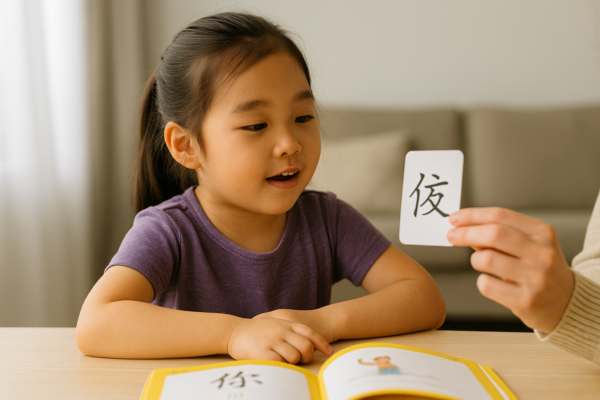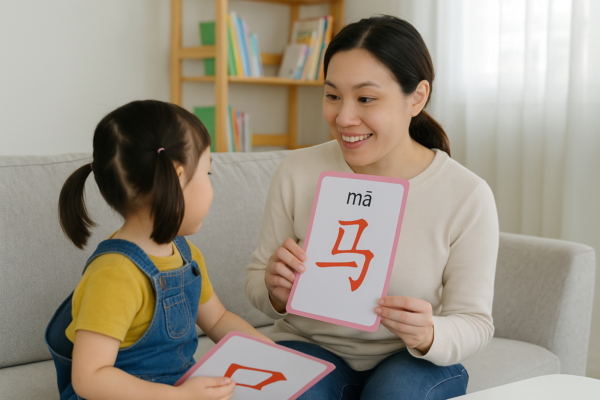10 Reasons Why Early Mandarin Education is Good for Your Kids
10 Reasons Why Early Mandarin Education is Good for Your Kids

Learning Mandarin has been crucially important for the past years, especially with how important it has become in global communication. Given its nature as one of the most spoken languages in the world, it is to no one’s surprise that learning Mandarin has been actively sought by others. To start learning Mandarin, it is highly recommended to begin with early Mandarin education, which can enhance memory retention and provide long-term language development benefits. Throughout this article, we will discuss how learning Mandarin can provide benefits for children.
Bilingualism in Children, Here’s How It Helps in Development

Learning language has been highly encouraged in many countries around the world. One of the most recommended languages to start while considering picking up a second language is Mandarin. Although learning a second language requires strong dedication and commitment in mastering skills, bilingualism is advised to start as early as possible. Being bilingual can provide the following benefits to a child’s cognitive development:
- Encourage problem solving skills – Past research has shown that learning a second language will help children develop a better problem solving ability. This improvement is pushed by the ability to see a problem from different perspectives. Other than problem solving, the research has also proven that bilingual children display a better grasp on managing multiple tasks.
- Improve memory retention – Language learning usually involves constant recall of learned vocabulary, grammar rules, and sentence structure. For younger children learning Mandarin, this practice can help encourage better memorization. This improved retention will not only help support Mandarin learning, but also help children to thrive better in academic fields.
- Building better focus – Children with bilingual skills usually will switch used language depending on who they are interacting with. This constant switch promotes better focus and encourages children to be able to eliminate any unnecessary distractions. With further practice, this habit can help children to engage over longer periods of time.
Benefits of Early Mandarin Education You Need to Know

Aside from helping speak in a second language, learning Mandarin also comes with practical advantages that will help your children thrive in the future. Here are the top 10 reasons on why early Mandarin education benefits your children.
Increase Familiarity
One of the advantages of learning Mandarin as a young child is to increase familiarity with its language. This sense of familiarity is highly important since Mandarin has unique language features, such as different tones and Chinese characters. Early exposure to Mandarin learning provides a smoother experience for children to learn Mandarin in a better flow while maintaining a comfortable learning environment.
Cognitive Development
Young children usually have the best capacity of learning something new as their cognitive ability is still under development. Research shows that children have better learning ability due to its constant improvement in consolidating new information, storing more memory into the brain. This development has been proven to support better absorption and memory retention.
Better Fluency
Learning at a fairly young age means children have been introduced to Mandarin as early as possible. This introduction is usually being carried out through different methods, such as daily conversations, songs, stories, and even videos. Early exposure toward Mandarin can help children learn naturally, especially regarding tones and pronunciation. The earlier kids start, the more easily they mimic the correct sounds, tones, and rhythms.
Boost Academic Performance
As Mandarin continues to gain global significance, many educational institutions have incorporated this language into their curriculums. By learning Mandarin as early as young children, students have a higher chance of achieving an overall academic performance. These increasing academic performance is supported by how children have grown familiar with the language features and usage.
Expand Social Network
Another key advantage of learning Mandarin as a child is the privilege of acquiring speaking skills as early as possible. This speaking skill for children is highly valuable, given how rapid Mandarin language has become throughout the years. With the increasing amount of Mandarin usage in different situations, learning this language as a young child can help them build conversation with Mandarin-speaking people, expanding their ability to maintain social interaction.
Long-Term Advantages
It is to no one’s surprise that early Mandarin education has been deemed as a great investment for children. Nowadays, Mandarin is more than just language, but can also serve as an asset to be used to support successful life in the future. In both academic and career fields, the existence of this language has become essential and can sometimes be a requirement. Therefore, fluency in Mandarin from early childhood will give them a competitive advantage in various fields.
Implement Learning Habits
Learning Mandarin as a child can also bring advantages in terms of learning habits. Language learning, especially with different language features from native, requires a consistent amount of study. Regular exposure to learning can help children manage their time effectively, building academic resilience and encouraging a growth mindset from early childhood. These habits will not only assist children in academic achievement, but also help build a better character to be implemented in life.
Opening Career Opportunities
As previously mentioned, learning Mandarin is an essential skill demanded by many companies–whether it’s a small business or multinational company. Children who begin Mandarin education at such an early age are in better positions for career opportunities that call for bilingual communication skills. Given the nature of Mandarin, many companies are constantly seeking individuals who can speak Mandarin in order to maintain relationships with both internal and external parties.
Learning Culture
Mandarin learning for children usually doesn’t stop at understanding vocabulary and encouraging conversational skills, but also improving cultural awareness. While learning Mandarin, children will also explore values, traditions, and histories of different Chinese cultures. This cultural knowledge is a great starting point for fostering empathy, shows respect, and demonstrates adaptability.
Builds Confidence
One of the challenges faced by adults while learning Mandarin is the low self-esteem of speaking and incorporating their skills in conversational and social interactions. This hesitation often comes from the fear of mispronunciation and anxiety of making mistakes in front of others. Children, however, don’t seem to portray the same problem, especially if they start learning from an early age. Children are most likely to engage openly and have less self consciousness. This will help them interact more frequently with others, sparking self-esteem to actively use Mandarin to communicate.
Practical Tips You Should Know to Encourage Early Mandarin Education for Children

We have discussed in the previous section how introducing Mandarin to children at an early age can be a great investment to the future. However, the process of learning can require much attention. An ideal learning environment for kids to learn Mandarin will usually involve both engagement and creativity, encouraging children to actively participate in the process. Here are a few practical tips to encourage early Mandarin education for children.
- Avoid Forcing
A solid principle that you need to remember while implementing early Mandarin learning for children is to create a stress free environment for them to grow. Less pressure can help children build confidence while learning, ensuring a better absorption of information while maintaining an enjoyable learning.
- Implement a Fun Learning
Children are prone to boredom, especially if they’re constantly exposed to learning materials. To keep children engaged in learning Mandarin, it is important to maintain enjoyment and fun activities while incorporating language materials. In this situation, using a Chinese storybook or learning Chinese idioms can be one of the effective solutions to maintain involvement in learning Mandarin.
- Keep Curiosity
Another way to keep children’s interest in learning is through subtly stimulating their curiosity through stories, traditions, and real-life experiences. Children are naturally curious, asking questions that spark their interest. Therefore, keeping a child’s curiosity can be a great solution to try to maintain their engagement level. Encourage children to ask questions and seek answers along the way.
- Give Constant Break
Although learning can be highly beneficial, it is important to give a break every once in a while. Given how children’s attention spans can be very limited, an adequate break is necessary to avoid learning burnout.
Conclusion
Early Mandarin education can bring a lot of advantages for children. Apart from the obvious benefit of bilingualism, learning Mandarin at a fairly young age can help improve memory retention, increase fluency, and even build confidence. The process of learning Mandarin for children can be quite complex to implement since it requires both involvement and entertaining contents. While learning by available resources can be sufficient, enrolling in courses can help children improve their skills while being guided by experts. Learn more about the arrangement by visiting us!





